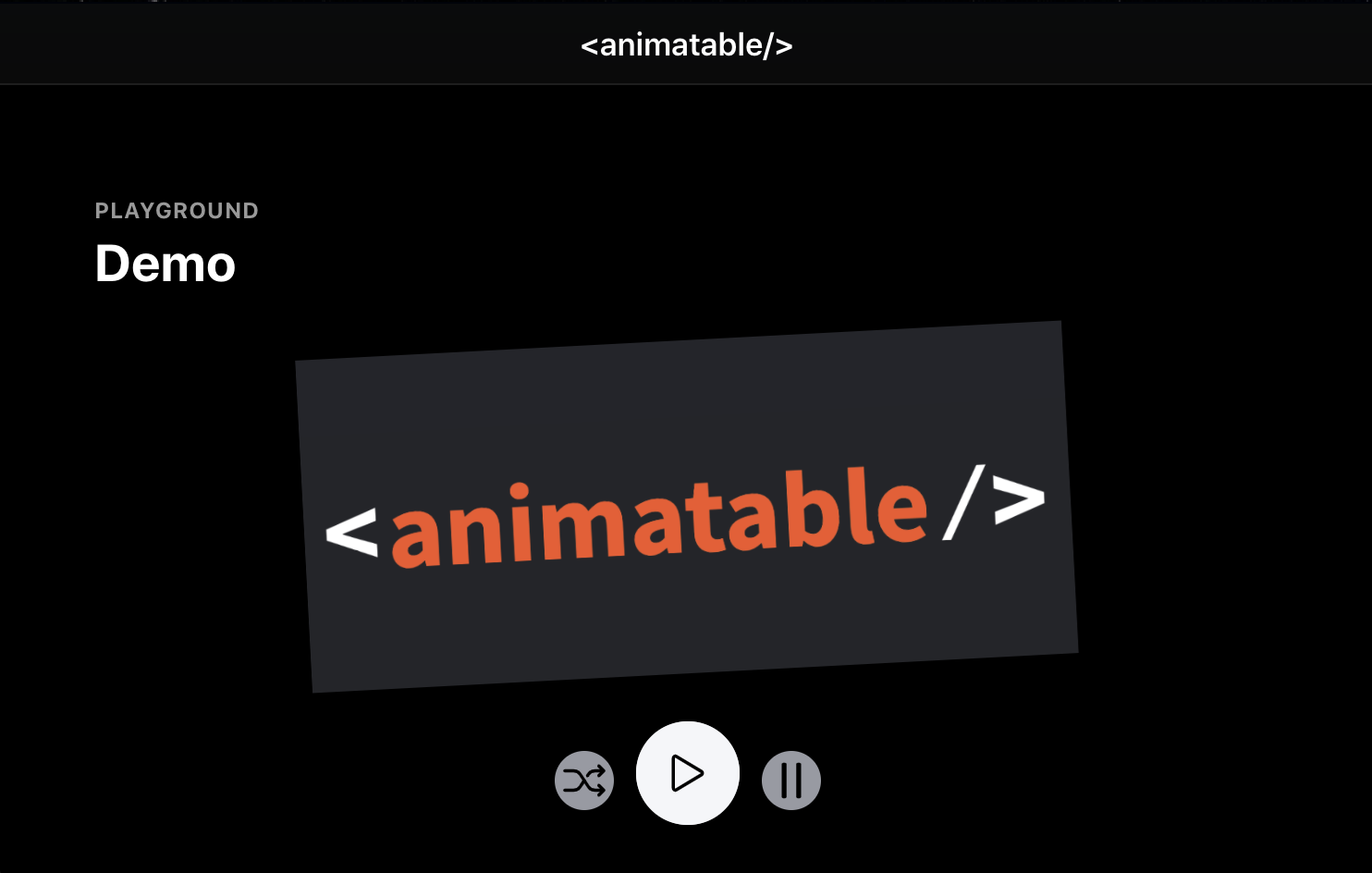<animatable/>Web Component built with Stencil.js to use Web Animations API in a declarative way. You can animate any HTML element easily:
<animatable-component
autoplay
easing="ease-in-out"
duration="800"
delay="300"
animation="tada"
>
<h1>Hello World</h1>
</animatable-component>With the largest list of Keyframes/Easing Functions that can also be used with other animation tools or Platforms! ?
Do you want to see this web component in action? Visit https://codepen.io/jdnichollsc/full/rNNYBbe yay! ?
<animatable />, a tiny Web Component: https://dev.to/jdnichollsc/meet-animatable-a-tiny-web-component-to-use-web-animations-api-as-a-component-1glh
Includes a PWA demo for debugging animations! ▶
<animatable-component autoplay iterations="3" animation="heartBeat" easing="ease-in" duration="1000">
<h1>Proof that Tony Stark has a heart ✵</h1>
</animatable-component><animatable-cube
autoplay
fill="forwards"
composite="add"
duration="2600"
easing="linear"
iterations="Infinity"
fromClassName="playing"
toClassName="finished"
animation="rotate-90-vertical-bck"
>
<div slot="front-face">Front</div>
<div slot="back-face">Back</div>
<div slot="right-face">Right</div>
<div slot="left-face">Left</div>
<div slot="top-face">Top</div>
<div slot="bottom-face">Bottom</div>
</animatable-cube>import {
ANIMATIONS,
EASING_FUNCTIONS,
EASING,
KEYFRAMES
} from '@proyecto26/animatable-component';
const bounceKeyFrames = KEYFRAMES[ANIMATIONS.BOUNCE];
const easingOutCubic = EASING_FUNCTIONS[EASING.EASE_OUT_CUBIC];
// Use here any other animation tool like Ionic Animations, AnimeJS, GSAP, etc! :)| Project | Package | Version | Links |
|---|---|---|---|
| Core | @proyecto26/animatable-component |
README.md |
|
| React | @proyecto26/animatable-component-react |
README.md |
<script src='https://cdn.jsdelivr.net/npm/@proyecto26/[email protected]/dist/animatable-component/animatable-component.esm.js'></script> in the head of your index.htmlnpm install @proyecto26/animatable-component --save<script src='node_modules/@proyecto26/animatable-component/dist/animatable-component/animatable-component.esm.js'></script> in the head of your index.htmlnpm install @proyecto26/animatable-component --saveimport @proyecto26/animatable-component;Using animatable-component component within an Angular project:
Including the CUSTOM_ELEMENTS_SCHEMA in the module allows the use of Web Components in the HTML files. Here is an example of adding it to AppModule:
import { BrowserModule } from '@angular/platform-browser';
import { CUSTOM_ELEMENTS_SCHEMA, NgModule } from '@angular/core';
import { AppComponent } from './app.component';
@NgModule({
declarations: [AppComponent],
imports: [BrowserModule],
bootstrap: [AppComponent],
schemas: [CUSTOM_ELEMENTS_SCHEMA]
})
export class AppModule {}The CUSTOM_ELEMENTS_SCHEMA needs to be included in any module that uses Animatable.
Animatable component includes a function used to load itself in the application window object. That function is called defineCustomElements() and needs to be executed once during the bootstrapping of your application. One convenient place to add it is in the main.ts file as follows:
import { enableProdMode } from '@angular/core';
import { platformBrowserDynamic } from '@angular/platform-browser-dynamic';
import { defineCustomElements as defineAnimatable } from '@proyecto26/animatable-component/loader';
import { AppModule } from './app/app.module';
import { environment } from './environments/environment';
if (environment.production) {
enableProdMode();
}
platformBrowserDynamic().bootstrapModule(AppModule)
.catch(err => console.log(err));
defineAnimatable(window);from stencil documentation
When using a wrapper component, It's not necessary to access the reference directly to attach events, etc. More details here.
import React from 'react';
import {
AnimatableComponent,
ANIMATIONS,
EASING
} from '@proyecto26/animatable-component-react';
const App = () => {
return (
<AnimatableComponent
autoPlay
delay={300}
duration={800}
composite='add'
direction='alternate'
iterations={Infinity}
animation={ANIMATIONS.TADA}
easing={EASING.EASE_IN_OUT_BACK}
onStart={() => console.log('Starting animation')}
onFinish={() => console.log('Finished animation')}
onCancel={() => console.log('Cancelled animation')}
>
<div>
<p>HELLO WORLD</p>
</div>
</AnimatableComponent>
);
};
export default App;Other option is using the web component directly:
import React from 'react'
import ReactDOM from 'react-dom'
import { defineCustomElements as defineAnimatable } from '@proyecto26/animatable-component/loader'
import App from './App';
ReactDOM.render(<App />, document.getElementById('root'));
defineAnimatable(window);from stencil documentation
In order to use the animatable-component Web Component inside of a Vue application, it should be modified to define the custom elements and to inform the Vue compiler which elements to ignore during compilation. This can all be done within the main.js file as follows:
import Vue from 'vue';
import { defineCustomElements as defineAnimatable } from '@proyecto26/animatable-component/loader'
import App from './App.vue';
Vue.config.productionTip = false;
Vue.config.ignoredElements = [/animatable-w*/];
// Bind the custom element to the window object
defineAnimatable(window);
new Vue({
render: h => h(App)
}).$mount('#app');from stencil documentation
To animate Functional Components you can use the createAnimatableComponent utility, e.g:
utils.tsximport {
createAnimatableComponent
} from '@proyecto26/animatable-component';
const SendMessageButton = (props) => (
<ion-fab-button {...props}>
<ion-icon name='send' />
</ion-fab-button>
);
export const AnimatableSendMessageButton = createAnimatableComponent(SendMessageButton);
export const keyFramesSendMessage: Keyframe[] = [
{
opacity: '0',
transform: 'rotate(0deg)'
},
{
opacity: '1',
transform: 'rotate(360deg)'
}
];
export const optionsSendMessage: KeyframeAnimationOptions = {
duration: 500,
easing: 'ease-in-out'
};my-component.tsximport { Component, Host, h } from '@stencil/core';
import { AnimatableSendMessageButton, keyFramesSendMessage, optionsSendMessage } from './utils'
@Component({
tag: 'my-component',
shadow: false
})
export class MyComponent {
render() {
return (
<AnimatableSendMessageButton
autoPlay
keyFrames={keyFramesSendMessage}
options={optionsSendMessage}
onFinish={() => alert('Eureka!')}
/>
)
}
}When contributing to this repository, please first discuss the change you wish to make via issue, email, or any other method with the owners of this repository before making a change.
Contributions are what make the open-source community such an amazing place to learn, inspire, and create. Any contributions you make are greatly appreciated ❤️.
You can learn more about how you can contribute to this project in the contribution guide.
I believe in Unicorns ? Support me, if you do too.
Donate Ethereum, ADA, BNB, SHIBA, USDT/USDC, DOGE, etc:
Wallet address: jdnichollsc.eth
Please let us know your contributions!
Available as part of the Tidelift Subscription.
The maintainers of <animatable/> and thousands of other packages are working with Tidelift to deliver commercial support and maintenance for the open source dependencies you use to build your applications. Save time, reduce risk, and improve code health, while paying the maintainers of the exact dependencies you use. Learn more.
To report a security vulnerability, please use the Tidelift security contact. Tidelift will coordinate the fix and disclosure.
This repository is available under the MIT License.
Made with ❤️